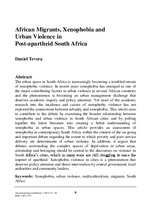African Migrants, Xenophobia and Urban Violence in Post-apartheid South Africa
Abstract
The urban space in South Africa is increasingly becoming a troubled terrain of xenophobic violence. In recent years xenophobia has emerged as one of the major contributing factors to urban violence in several African countries and the phenomenon is becoming an urban management challenge that deserves academic inquiry and policy attention. Yet most of the academic research into the incidence and causes of xenophobic violence has not explored the connections between urbanity and xenophobia. This article aims to contribute to the debate by examining the broader relationship between xenophobia and urban violence in South African cities and by pulling together the latest literature into creating a better understanding of xenophobia in urban spaces. This article provides an assessment of xenophobia in contemporary South Africa within the context of the on-going and important debate regarding the extent to which poverty and poor service delivery are determinants of urban violence. In addition, it argues that debates surrounding the complex spaces of deprivation in urban areas, citizenship and belonging should be central to the discourses on violence in South Africa’s cities, which in many ways are still struggling to erase the imprint of apartheid. Xenophobic violence in cities is a phenomenon that deserves policy attention and direct intervention by central government, local authorities and community leaders.

